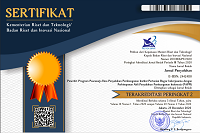PENGUATAN KELEMBAGAAN PETANI PADI DALAM PENGAMBILAN KEPUTUSAN ADOPSI TEKNOLOGI IPB PRIMA
Abstract
Farmer institutional strengthening is an effort to improve farmers' adoption decisions on an innovation. Farmers who are members of farmer groups will find it easier to manage to know, want, and be able to implement innovation. This study aims to analyze the influence of farmer institutional strengthening on IPB Prima Technology adoption decisions by rice farmers. This study uses a quantitative and quantitative approach with survey methods and questionnaires as a data collection tool. Respondents in this study were all members of the farmer group who participated in IPB 3S variety rice cultivation activities, as many as 50 people. Data was collected in July 2018. Data were analyzed using Statistical Product and Service Solutions (SPSS) version 23 for descriptive statistics and inferential statistics. The results showed that farmers agreed that farmer institutions functioned as strengthening the institutional structure of farmers, increasing the capacity of members in the development of agribusiness and improving the institutional capacity of farmers in carrying out their functions. In the decision of farmers to adopt Prima IPB Technology, farmers have reused straw on agricultural land and have cultivated rice plants in accordance with IPB Best-Practice, but farmers have never decomposed straw using decomposers and are still rare in the application of agricultural mechanization. Improving the institutional capacity of farmers in carrying out their functions significantly influences the application of IPB Bio and the implementation of IPB Best-Practice. Furthermore, increasing the ability of members in the development of agribusiness, especially the efficiency of time, has a significant negative effect on reuse of straw, by burning straw on agricultural land.
Downloads
References
Abdullah A. 2008. Peranan penyuluhan dan kelompok tani ternak untuk meningkatkan adopsi teknologi dalam peternakan sapi potong. Prosiding Seminar Nasional Sapi Potong, Palu (ID). Fakultas Peternakan Universitas Hasanuddin Makassar Sulawesi Selatan (ID).
Anantanyu S. 2011. Kelembagaan Petani: Peran dan Strategi Pengembangan Kapasitasnya. Jurnal Sosial Ekonomi Pertanian dan Agribisnis. (SEPA) 7 (2) 102–109. ISSN 1829-9946
Aswidinnor H, Willy B. Suwarno, Desta Wirnas, Yudiwanti We Kusumo. 2016. Teknologi Produksi Optimum (IPB-Prima) Padi Varietas IPB 3S dan IPB 4S. Departemen Agronomi Dan Hortikultura. Fakultas Pertanian. Institut Pertanian Bogor.
Hermanto KS dan D Swastika. 2011. Penguatan kelompok tani : langkah awal peningkatan kesejahtraan petani. Jurnal Analisis Kebijakan Pertanian. 9: 371-390.
Nirwani P, Dompak N, Pera N. 2012. Pengaruh Foto dan Lukisan Pada Buklit terhadap Peningkatan Pengetahuan Petani Padi Sawah tentang Pupuk Organik di Desa Lagan Hulu. Jurnal Sosial Ekonomika Bisnis. 1412-8241.
Prasetyo AF dan Awaludin A. 2016. Peran Kelembagaan Peternak Dalam Adopsi Teknologi. Jurnal Ilmiah INOVASI. 1 (2): 1411-5549
Zakaria WA. 2009. Penguatan Kelembagaan Kelompok Tani Kunci Kesejahteraan Petani. Seminar Nasional Dinamika Pembangunan Pertanian dan Perdesaan. Prosiding Seminar Nasional Dinamika Pembangunan Pertanian dan Perdesaan
Zamzami M. 2017. Analisis Komparatif Usahatani Padi Sawah Varietas IPB 3S dengan Varietas Ciherang di Gampong Meunasah Pulo Kecamatan Sawang Kabupaten Aceh Utara. [Skripsi]. Aceh Utara (ID). Universitas Malikussaleh.
Authors who publish with this journal agree to the following terms:
- Authors retain copyright and grant the journal right of first publication with the work simultaneously licensed under a

This work is licensed under a Creative Commons Attribution 4.0 International License that allows others to share the work with an acknowledgement of the work's authorship and initial publication in this journal. - Authors are able to enter into separate, additional contractual arrangements for the non-exclusive distribution of the journal's published version of the work (e.g., post it to an institutional repository or publish it in a book), with an acknowledgement of its initial publication in this journal.
- Authors are permitted and encouraged to post their work online (e.g., in institutional repositories or on their website) prior to and during the submission process, as it can lead to productive exchanges, as well as earlier and greater citation of published work (See The Effect of Open Access).















